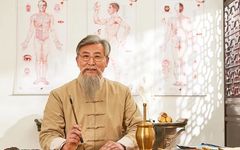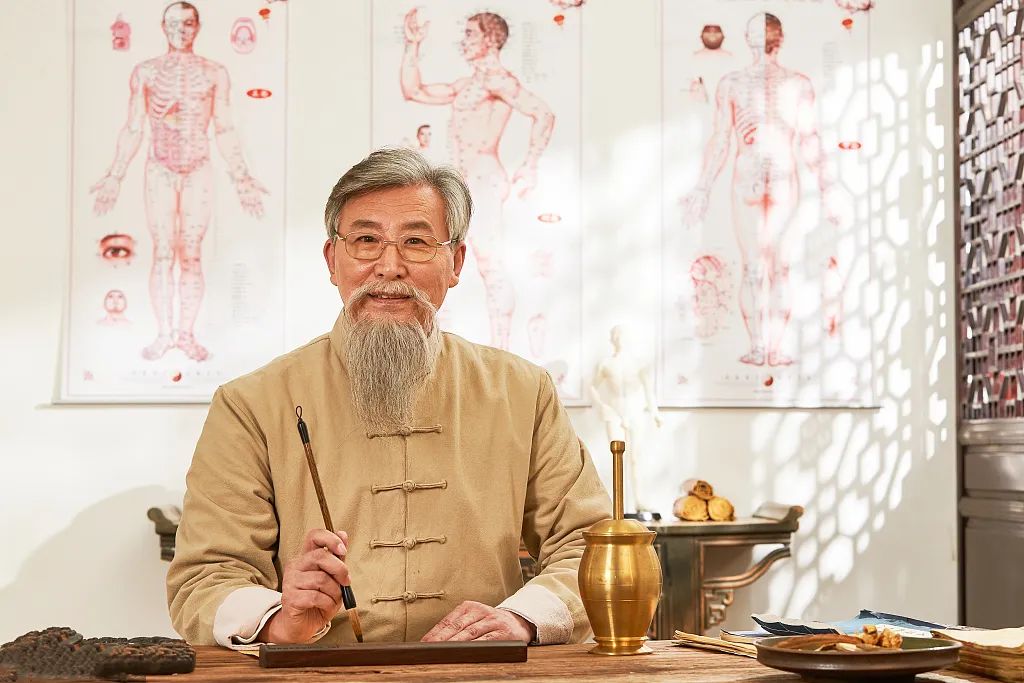


After years of popular science from various experts and health media, I believe many of you have established a health concept: dampness is the root of all evil, and removing dampness can eliminate many diseases. In short, many people, upon encountering “dampness,” think of driving it out of their bodies as if they were sending away a plague god.
However, much of the information that has been widely circulated and copied by some self-media simply encourages everyone to remove dampness, detoxify, as if it were as simple and crude as draining a pool of water, only showing the “benefits” while completely ignoring the “drawbacks” and “contraindications” that also exist.
Seeing more and more people joining this camp, I feel it is necessary to pour some cold water on this situation.



 Drinking Incorrectly Prepared Red Bean and Job’s Tears Water Can Deplete Yin and Damage the Spleen
Drinking Incorrectly Prepared Red Bean and Job’s Tears Water Can Deplete Yin and Damage the Spleen

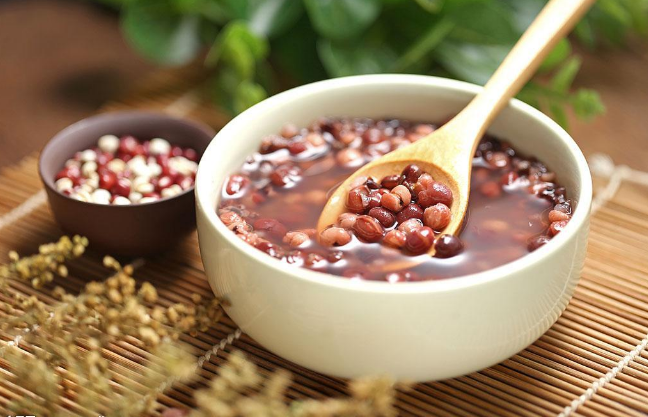
I believe that those busy with dampness removal have at some point relied on this method. Even health novices have heard of its benefits.
However, many people have experienced side effects after drinking Red Bean and Job’s Tears water for a period, such as dry eyes, dry nose, dry mouth, dry throat, diarrhea, and even worsening skin conditions, dry stools, and reduced menstrual flow…
Let’s analyze this. The “red bean” in the formula refers to the small, long “Chi Xiao Dou (Red Bean),” which can be used medicinally.
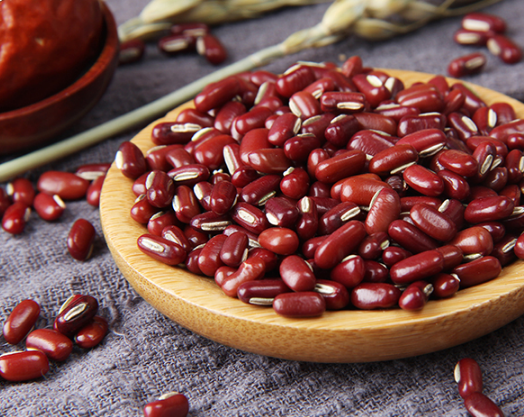
Chi Xiao Dou (Red Bean): Many traditional Chinese medicine texts state that Chi Xiao Dou can promote urination and reduce swelling, showing good effects on various conditions caused by internal dampness. For example, Li Shizhen believed it “promotes the flow of body fluids and facilitates urination,” meaning that if the body’s fluids are not circulating smoothly or if there is “bad water” accumulating, as long as it is within the applicable range of Chi Xiao Dou, it can be normalized through urination.
Job’s Tears, on the other hand, is considered by TCM to have a sweet and bland flavor, a cool nature, and can promote urination, drain dampness, strengthen the spleen, and stop diarrhea. Similarly, Job’s Tears can effectively treat edema and urinary difficulties caused by internal dampness or abdominal distension and urinary difficulties due to spleen deficiency and excess dampness.
In summary, if one has a condition of spleen and stomach damp-heat, such as feeling hot, having a thick yellow tongue coating, teeth marks on the tongue, oily skin and hair, and edema in the arms and legs, consuming Red Bean and Job’s Tears water in moderation can indeed be beneficial, but the principle is also “stop when the disease is resolved”; once the problem is resolved, stop.
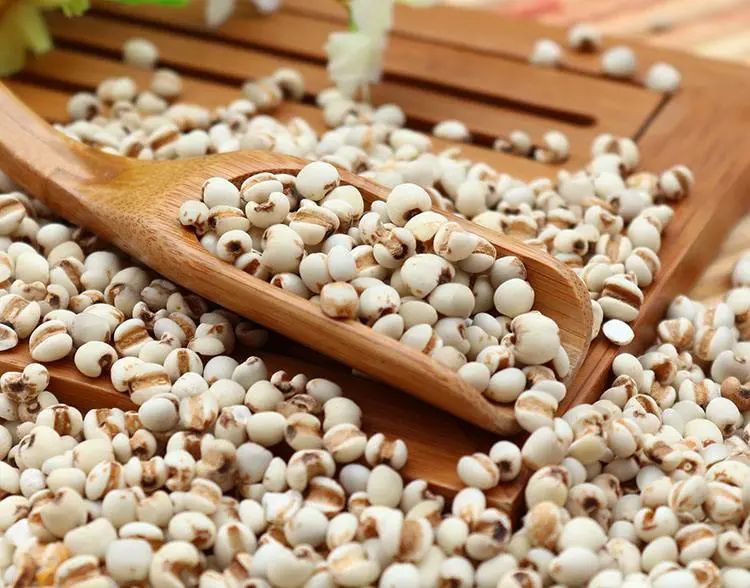
Yiyiren (Job’s Tears): Recognizing the above benefits, along with the fact that these two ingredients are both food and medicine, unlike those “serious medicinal materials” that can be daunting and require a doctor’s prescription to consume safely, many people believe they are harmless and can be consumed without worry…
In fact, ancient herbal texts have detailed the adverse effects of these two:
Chi Xiao Dou:
Long-term use can lead to blackened, thin, and dry skin, also due to its diuretic properties. ——《本草衍义》
Long-term use can excessively lower fluids and blood, leading to thin muscles and heavy body. ——《本草纲目》
Most diuretic, long-term use can lead to dryness, thin muscles, and heavy body… Stop when the disease is resolved, do not exceed the dosage. ——《本草害利》
Yiyiren:
For those with dry stools, short urination, or cold-induced cramps, and those with spleen deficiency and no dampness should avoid it. Not recommended for pregnant women. ——《本草经疏》
This is a medicine for removing dampness and drying the spleen; those with dry stools, short urination, or cold-induced cramps, and those with spleen deficiency and no dampness should avoid it. Not recommended for pregnant women. ——《本草害利》
In simple terms, both Chi Xiao Dou and Yiyiren tend to have downward effects. While they can expel the dampness retained in the body through diuresis, they can also disturb the body’s precious yin fluids, easily leading to unnecessary loss.
If used improperly, drinking excessively, or if one already has conditions of easy thirst, irritability, insomnia, dryness of the nose, mouth, skin, short urination, dry stools, and constipation, as well as those with a lean, weak physique who cannot gain weight due to spleen and stomach yin deficiency, blindly and excessively consuming these can be akin to poisoning oneself.
Moreover, if one already has a weak cold spleen and stomach, or a cold-damp constitution, using only Yiyiren or drinking Red Bean and Job’s Tears water can easily damage the spleen yang, affecting the normal transformation of nutrients and hindering the process of expelling dampness, leading to further accumulation of dampness in the body.
Additionally, if pregnant women consume Yiyiren, it may lead to premature birth. Even though it is now advocated to roast Yiyiren to reduce its cooling properties, it cannot eliminate its inherent nature of easily depleting body fluids.
Therefore, no matter how highly praised Red Bean and Job’s Tears water may be, if it deviates from the principles of “suitability,” “moderation,” and “appropriateness,” it can become a harmful factor for your body.

 Blindly Sweating to Remove Dampness Can Harm Yin and Deplete Yang
Blindly Sweating to Remove Dampness Can Harm Yin and Deplete Yang

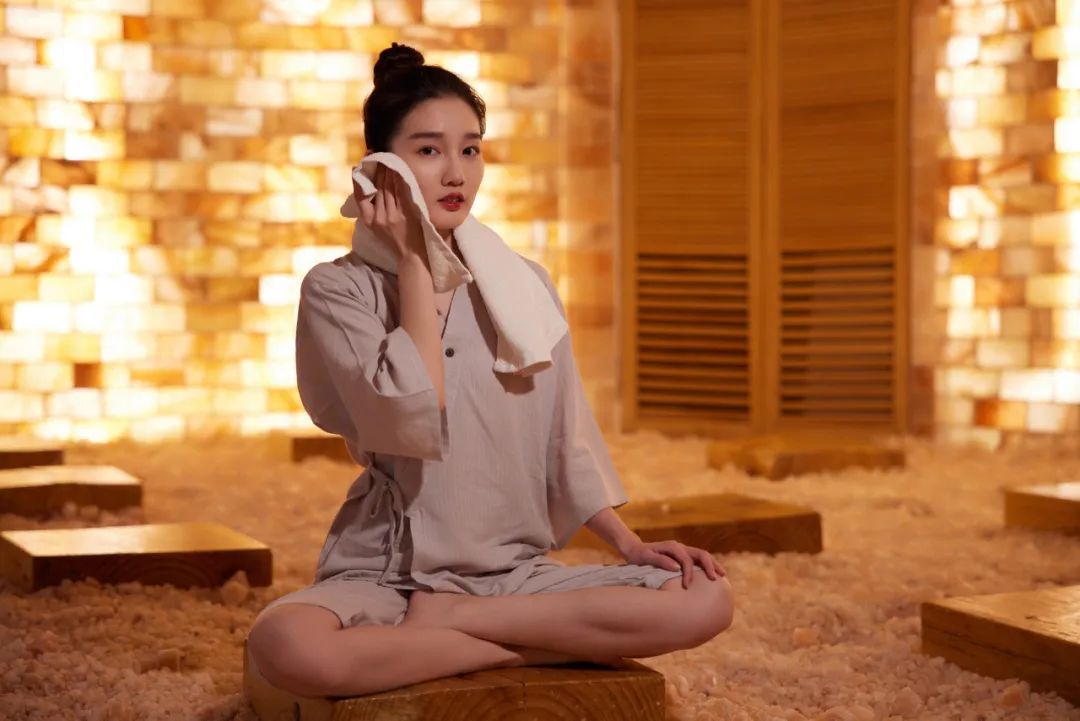
Currently popular methods for removing dampness, besides Red Bean and Job’s Tears water, many people rely on exercise and sweating. Some even resort to therapies like fire therapy and governing meridian moxibustion to induce sweating, seemingly to remove dampness and detoxify.
Some believe that sweating profusely, feeling drenched as if caught in the rain, can help expel the annoying dampness, as it is all water.
But who has not experienced this: after a period of intense exercise to sweat, or frequent sweating sessions, fire therapy, or governing meridian moxibustion, one may experience palpitations, fatigue, dry mouth, dry skin, excessive sweating, reduced menstrual flow, amenorrhea, or become more susceptible to colds, feeling weaker and more sensitive to cold.
From the perspective of TCM, sweat is not simply a liquid metabolic product composed of water, sodium chloride, urea, lactic acid, and fatty acids. The various discomforts that arise after excessive sweating to remove dampness are actually the result of excessive leakage, ultimately harming essence and depleting qi.
First, the production of sweat comes from the transformation of nutrients generated through daily diet, breathing, and sleep. It is a very important component of the body’s yin fluids. The saying “sweat and blood share the same source” and “sweat is the fluid of the heart” reflects the preciousness of sweat.
Secondly, “yang added to yin is called sweat.” This means that the process of sweating requires sufficient yin fluids and essence as a material basis, as well as yang energy to warm, vaporize, and promote, as a driving force to open the pores and allow fluids to escape the body, thus achieving the function of sweating.
In summary, sweating is a physiological process that requires sufficient yin and yang in the body to work together. Excessive reliance on such methods without regard for one’s own condition, violently forcing oneself to sweat to remove dampness, will only lead to damage to both yin and yang.
Those who are already deficient in qi and blood, physically weak, prone to colds, or who often stay up late, have poor sleep, are chronically fatigued, or overthink should especially take note.

 Three Principles to Remove Dampness Without Harming the Body
Three Principles to Remove Dampness Without Harming the Body

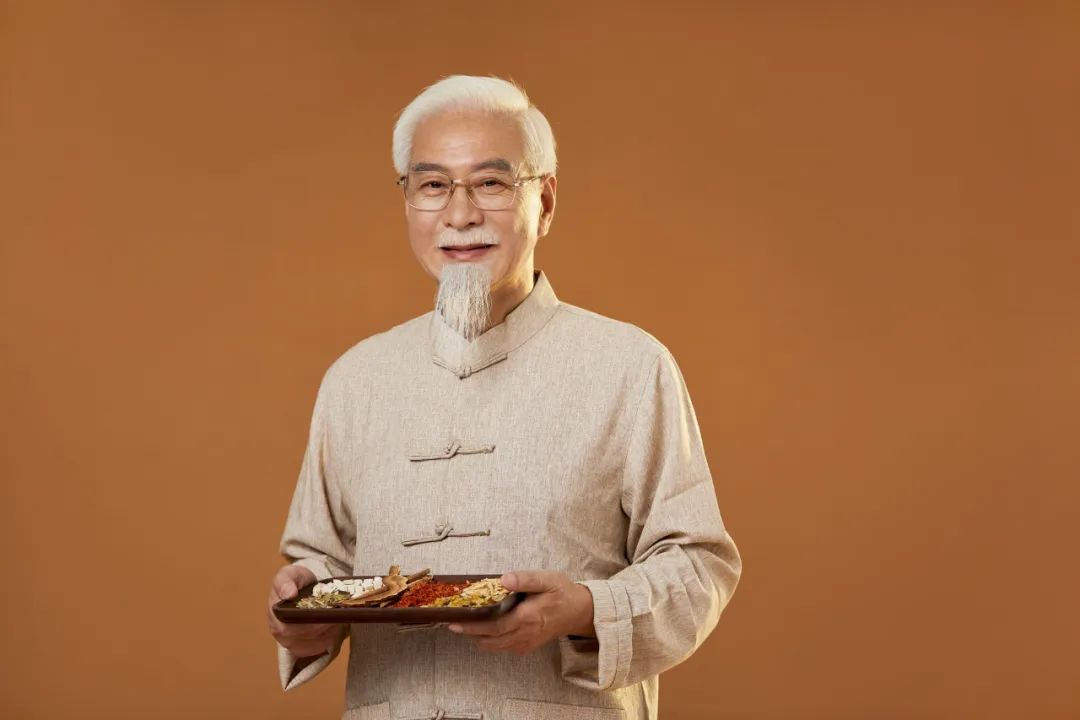
Those who have studied dampness removal probably know that the root cause of internal dampness and phlegm retention lies in the spleen and stomach. When the transformation process is problematic, what should be expelled cannot be expelled, making it difficult to ward off external pathogens, leading to internal issues.
My stance is that the three principles of “controlling the mouth,” “not acting recklessly,” and “appropriate movement” are reliable methods for strengthening the spleen, removing dampness, and transforming phlegm, suitable for all ages.
1. Control the Mouth
“Controlling the mouth” refers to the principle of “moderation in food and drink” as stated in the Huangdi Neijing. This means not only being mindful of what you eat but also how you drink.
This not only protects the spleen and stomach, which are the main systems for transforming and transporting dampness, but also helps to avoid the invasion of phlegm-dampness from entering through the mouth.
“Moderation” requires us to have regular meals, chew slowly, avoid overeating, and not alternate between fasting and feasting. It also requires us to restrain the intake of certain foods that the spleen and stomach do not welcome, such as:
Raw: Uncooked foods, such as sashimi, cold salads, and raw vegetables. These foods are low in temperature and can inhibit spleen and stomach function, making them difficult to digest, leading to stagnation.
Cold: This refers to foods that are colder than body temperature, such as chilled watermelon, cold beer, and foods taken directly from the refrigerator; it also refers to inherently cold foods like dragon fruit, kiwi, strawberries, pears, cherry tomatoes, and various melons.
Sticky: This includes sticky foods like zongzi, tangyuan, and sticky rice cakes, as well as rich, sticky tonics like donkey-hide gelatin, deer antler, and sea cucumber, which are difficult to digest and can lead to gastrointestinal stagnation and internal phlegm generation.
Stagnant: Foods that can cause gas, belching, and bloating, such as sweet potatoes, taro, chestnuts, and coarse grains. Those with particularly poor digestion or digestive issues should avoid these foods.
Fatty: This refers to rich, greasy foods, including fried and roasted foods, as well as foods high in animal protein, such as donkey-hide gelatin, deer antler, sea cucumber, abalone, and various meats.
Sweet: This specifically refers to foods with added sugars, such as pastries, chocolates, candies, juices, sodas, and milk tea.
Heavy Flavors: This refers to foods that are overly seasoned, whether home-cooked or from restaurants, where people often complain about blandness and end up eating overly sweet, spicy, salty, or oily foods. Long-term heavy seasoning can lead to organ imbalance, depleting the spleen and stomach’s essence, making it easier for phlegm-dampness to accumulate.
Everyone can take a screenshot to save and gradually experience and practice these principles. My mention of “moderation” or “restraining intake” does not mean to completely eliminate certain foods but rather to allow everyone to decide based on their own constitution when to eat, how much to eat, and for how long.
Additionally, I want to talk about drinking water.
In TCM, there is not only food stagnation but also “drinking stagnation.” This “drinking” is a specific manifestation of the dampness and damp pathogens you hate, caused by water and fluids failing to be transformed and pathologically retained in the body, leading to what is known as “water stagnation leading to phlegm.”
The Huangdi Neijing clearly states that the water consumed must go through the same digestive and absorption processes as food, requiring the organs to cooperate and consume essence to complete the entire process of digestion, transformation, absorption, and excretion. It is not the case that the water you drink can directly hydrate your body.
However, if one drinks excessively, such as forcing oneself to drink eight glasses of water a day without regard for their constitution and dietary conditions, or chugging a large glass of water upon waking, or forcing oneself to drink at set times, these so-called “detox” or “disease-removing” behaviors can lead to problems far beyond just increasing dampness.
Being mindful and having moderation in diet can allow you to fill your stomach, quench your thirst, and enjoy delicious food while letting both body and mind receive nourishment from food, rather than being harmed by the food itself and bad habits.
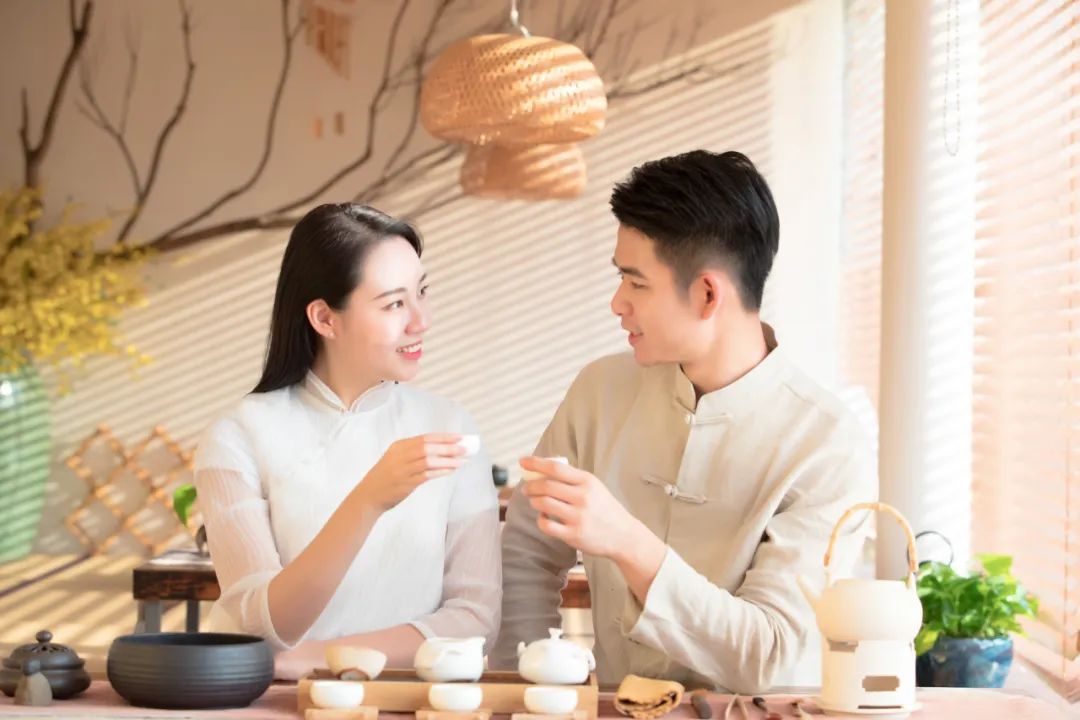
2. Do Not Act Recklessly
“Not acting recklessly” is a very important point. This not only refers to bad habits that add dampness to the body but also emphasizes caution in dealing with dampness.
First, let’s discuss bad habits that add dampness to the body, including but not limited to:
1. Improper diet that harms the spleen and stomach and adds dampness;
2. Prolonged sitting or lying down, being lazy and inactive;
3. Showering immediately after sweating from exercise or chugging water/drinks;
4. Staying up late and not getting up on time, preventing yang energy from rising;
5. Not drying oneself after washing hair, bathing, or getting caught in the rain;
6. Excessive cooling, constantly using air conditioning or fans, and disliking sweating;
7. Wearing damp clothes;
8. Wearing insufficient clothing in cold weather, failing to keep warm;
9. Frequently exposing the abdomen, lower back, knees, and ankles;
10. Holding in anger, suppressing emotions, and being easily agitated;
11. Overthinking and worrying excessively.
The last two points deserve special mention. Bad emotions or excessive worry can directly or indirectly affect the operation of the spleen and stomach, as well as the overall qi mechanism, impacting the movement and expulsion of dampness.
Dampness is like computer junk; to reduce it, cleaning is essential, but it is also crucial to minimize or avoid the various possibilities that generate this junk. Otherwise, no matter how diligently you clean, if you do not improve in aspects of diet, living, emotions, and psychology, you will not see significant changes, and your efforts will be in vain, which can be discouraging.
Secondly, “not acting recklessly” is a reminder that the methods for removing dampness vary according to individual conditions and constitutions.
“Ecology” refers to the organic connection between living beings and their environment. Ecological ethics is the moral perspective, basic norms, and ethical practices regarding the relationship between life and the ecological environment. Since the 20th century, with the widespread recognition of environmental crises, ecological awareness has emerged from professional circles to the public stage, tasked with influencing human environmental practices and maintaining global ecological balance, becoming a prominent subject. Taoism is not ecology, but its ecological ethical spirit is irreplaceable due to its unique characteristics, which is why it has thrived and continues to influence today. In terms of ethical understanding, Taoism emphasizes the joy, tranquility, simplicity, and enrichment of life, focusing on the harmony between self and nature, prioritizing humanity, and possessing profound yet simple content that is infinitely interesting; in terms of ethical practice, Taoism is dedicated to cultivating the essence of life, nurturing oneself, and seeking a life of emotional, behavioral, natural, human, and cultural interaction. Therefore, it reflects a conscious initiative to develop the vitality of life, the unity with natural objects, and the holistic system of ethical understanding. In Taoist terms, it is about “not violating the natural way” and “following the natural way.” This nature refers to the essence of things, the nature of life, and the nature of society. Understanding the essence of things, life, and society, and seeking the style, attitude, and demeanor that life and nature should have is the goal and spiritual pillar of Taoist ethics.
The ecological ethical spirit of Taoism is reflected in its exquisite and profound content and the appeal it holds for the world, embedded in the vitality that allows it to endure and develop over time. Specifically, the ecological ethical spirit of Taoism is manifested in six aspects:
1. The spirit of unity of all things. The highest object of worship in Taoism is the “Dao.” The purpose of Taoism is to achieve immortality and become a celestial being. Achieving the Dao means integrating with the great Dao through cultivation. Therefore, Taoism is the religion that emphasizes real life among many religions in China. It believes that all things in the world are one, and the existence of all things in nature is rational. Humans are part of the universe and should find joy in life, valuing life over death, allowing life to continuously transcend. Humans should also respect the existence and individuality of all things with an equal consciousness. The early Taoist classic “Taiping Jing” states: “Heaven and Earth are harmonious and united, giving birth to all things,” suggesting that the ideal peaceful world is one where humans coexist harmoniously with all levels of natural things, sharing prosperity. In the thoughts of Taoist thinker Ge Hong, the awareness of equality among all things is also very clear and rich. He believes that through cultivation, humans can achieve the ideal of “longevity” and “immortalization,” which is the realm of unity with nature or the oneness of all things. Taoism also has the thought of “the unity of life and the Dao, valuing life,” as Laozi pointed out, the Dao is the origin of the universe, the Dao gives birth to one, one gives birth to two, two gives birth to three, and three gives birth to all things. Zhuangzi said: “Heaven and Earth are born with me, and all things are one with me.” This indicates that Taoism emphasizes understanding and grasping human intentions from the height of the universe. The ecological ethical spirit of the unity of all things teaches people to live in harmony with nature and create a society of harmonious coexistence.
2. The spirit of giving birth without possession. Related to the spirit of unity of all things, Taoism believes that the highest realm and standard of life is the morality of producing all things without possessing them. Taoism believes that the highest realm of physical cultivation and spiritual perfection is the “Dao.” How is the Dao produced? Ge Hong proposed: “The Dao arises from one, its value is unique, each resides in its place, symbolizing heaven, earth, and humanity, hence it is called the three unities.” Heaven obtains one to be clear, earth obtains one to be peaceful, humanity obtains one to be alive, and spirit obtains one to be spiritual. He also believes this is an elaboration of Laozi’s wisdom of the great Dao. Laozi pointed out that “humans follow the earth, the earth follows heaven, heaven follows the Dao, and the Dao follows nature,” and the essence of nature is: “The Dao is revered, virtue is precious, and nothing commands it but remains natural. Therefore, the Dao gives birth, virtue nurtures, grows, protects, and covers, giving birth without possession, acting without reliance, and nurturing without controlling, this is called profound virtue.” Thus, only “following the Dao of nature” aligns with moral thought. Noble morality lies in proliferating all things without claiming them for oneself, helping all things without boasting of one’s contributions, and guiding all things without dominating them. The Tang dynasty Taoist scholar and physician Sun Simiao practiced this spirit, basing his medical theory on the unity of heaven and humanity, stating: “Heaven has four seasons and five elements, humans have four limbs and five organs, yang uses its form, and yin uses its essence, which is the same for both heaven and humanity. A good doctor guides with medicine and stones, saves with needles and agents, while a sage harmonizes with supreme virtue, assisting with human affairs, thus the body can heal from diseases, and heaven and earth can eliminate disasters.” Sun Simiao himself was not only skilled in medicine but also possessed high moral character. The spirit of giving birth without possession in Taoism has considerable practicality and universal significance, proposing the concept of sustainable development of worldly matters, revealing that humanity must follow nature and emulate natural laws, knowing when to act and when not to, to achieve results; if one forcibly takes, it will backfire, destroying harmony and preventing the attainment of a high realm.
3. The spirit of nurturing all things. Before Taoism, the “Zhou Yi” stated: “The great person aligns their virtue with heaven and earth, their brightness with the sun and moon, and their order with the four seasons.” Here, it points out that the heavenly way and earthly way are opposing yet coordinated, and this coordination is mediated by humans. Laozi elevates humans to an important position: “Thus, the Dao is great, heaven is great, earth is great, and humanity is also great. Among the four greats, humans occupy one.” Since “humanity is also great,” humans are not merely dependent on nature, subject to it, but must harness natural laws. Because humans rely on nature for survival, they must engage in material exchanges with it. Taoism further proposes that humans should think carefully, assess the situation, and seek immortality and the Dao without acting recklessly; if one goes against the Dao and acts recklessly, it will inevitably harm their nature and even endanger humanity itself. Practitioners of Taoism believe that humans and all things in the universe are mutually responsive, and the basis of this response lies in the spirituality of both humans and all things. The universe evolves continuously, and as a member of the cosmic community, humans should aim to promote the harmony and perfection of the entire universe, rather than engage in destructive behaviors that stifle the vitality of the universe. Therefore, Taoism not only provides a belief system for people to find their place in life or focus on the perfection and adherence to doctrines but also materializes beliefs or doctrines into various practices and techniques, forming an operational system that guides followers to practice diligently. It can be said that Taoism is a religion that emphasizes the Dao, techniques, and actions, valuing the elevation of the Dao while actively promoting practices and cultivation techniques. A true disciple of the Dao comprehensively grasps the essence of Taoism, not only understanding its fundamental purpose or possessing sincere faith but also undergoing training in techniques, diligently accumulating Daoist merit, and continuously deepening and purifying their faith. This emphasizes the initiative of human activity and the adaptability of humans to nature. As intermediaries and coordinators between heaven and earth, humans must both follow nature and regulate its changes, guiding it to nurture all things.
4. The spirit of unity in diversity. The spirit of unity in diversity in Taoism is inherited from the “harmony” spirit in traditional ethics. The Taoist “Taiping Jing” states: “Harmony is the master of all things,” believing that all levels of things in the natural world and human society contain the three basic elements of yin, yang, and harmony, which together constitute one entity, hence the name of the three names united in heart. “The original qi has three names: the sun, the moon, and harmony. The body has three names: heaven, earth, and humanity. Heaven has three names: the sun, the moon, and the stars, with the North Star as the center. The earth has three names: mountains, rivers, and flat land. Humanity has three names: father, mother, and child. Governance has three names: ruler, minister, and people.” The three names united in heart represent the ideal peaceful world. The way of yin and yang reflects heavenly will, so humans must follow the principles of yin and yang, maintaining harmony between people and between humans and nature in all aspects to eliminate disasters and achieve a peaceful world. To achieve this goal, Taoism has developed the thought of harmony in its belief system, alchemical techniques, and ritual norms. The ecological wisdom of unity in diversity helps people recognize the significance of the existence of diversity in the world. Protecting the diversity of things can lead to sustainable development.
5. The spirit of cyclical regeneration. In terms of how to effectively utilize nature, traditional Chinese people have established the goals of “greatness” and “longevity,” believing that to achieve these goals, one must possess upright virtue, emulate heaven and earth, and use systems to regulate human insatiable desires, preventing harm to nature and humanity. The “Zhou Yi” points out two paths: one is “the second line is auspicious, as it is in the middle.” The other is “the middle is correct and connects. Heaven and earth are regulated, and the four seasons are formed; regulation governs the world, without harming wealth or harming people.” Taoism has also developed similar thoughts, emphasizing that confirming the conditions of life and existence is the wisdom and virtue of sages, and the ideal living world for humans is a beautiful society where humanity and nature are one. In such a society, life can circulate continuously, flowing without interruption, and thriving endlessly. Early Taoism believed that those who achieved immortality could either grow wings and fly or transform into different forms, even changing from a bird to a clam. Later Taoism absorbed more daily thoughts on humanity, starting from the perspective of life’s cyclical regeneration, regarding “aging without decline, longevity, and freedom of movement” as the path of immortality. The Taoist scholar Tan Qiao from the Five Dynasties viewed the universe, life, and society through the lens of “transformation,” proposing: “The spirit transforms into qi, qi transforms into form, form transforms into essence, essence transforms into spirit, and spirit transforms into respect…” The prosperity of life and society exists in the process of change and unity. In terms of utilizing resources, Taoism advocates for humans to restrain their desires, maintaining the vitality and development of all things, which aligns with traditional Chinese thoughts on seasonal practices, such as prohibiting logging before summer, banning the capture of young animals and birds, and not overfishing or burning forests. Humans must engage in material exchanges with biological resources. Engaging in material exchanges is not about forcible possession but about adapting and adjusting to nature.
6. The spirit of interconnectedness. Taoist thought has always viewed nature as a super-large system full of life, where all things are organically connected. The universe operates as the intersection of time and space coordinates. From the beginning of Laozi and Zhuangzi, the mysteries of nature have been explored to reveal the inherent relationships within the natural world. Laozi said: “The great Dao is vast and can be approached from either side. All things are sustained by it, and it nourishes without claiming to be the master, always without desire, which can be named small. All things return to it without claiming to be the master, which can be named great. Because it never claims to be great, it can achieve greatness.” This means that the great Dao nourishes all things like a vast river, without selfishness or bias, like a great mother caring for all life, and all life relies on the Dao for sustenance. Treating the natural world kindly is essential because fundamentally, “humans and heaven are one.” Therefore, it is necessary to protect the ecological environment. Zhuangzi said: “All things are seeds, differing in form, beginning and end like a ring, with no clear start or end, this is called heavenly balance. Heavenly balance is the essence of heaven.” This means that all things come from specific species, but there are also connections and transformations between different material species, like a ring, with no clear beginning or end. This natural interconnectedness can be called “heavenly balance.” Taoism believes that the Dao is the origin of the world, the source of all life, and the driving force behind the generation of all things. Tang dynasty Taoist Wu Jun said: “The Dao is the way of nurturing life, and the Dao is inherently nameless. When discussing it, heaven, earth, and humanity, spirits, immortals, and gods cannot exist without the Dao, nor can they be completed without virtue. Life does not know its beginning, and completion does not know its end. Exploring the hidden and the obscure, no one can see its origin, entering the end of existence and exiting the beginning of non-existence, no one can fathom its essence, this is called nature. Nature is the constant of virtue and the framework of heaven and earth.” This is based on the inherent principles of the material world, reasoning the significance of moral essence for the material world, which contains the ecological ethical wisdom of continuous vitality and orderly existence. The Dao is the origin of the universe and the starting point for observing all things; from the perspective of the Dao, heaven and earth are one, all things are together, and there is no distinction between objects and self; although the forms of heaven and earth are different, and the affairs of humanity have their own principles, fundamentally, they all follow their nature, fulfilling their essence, and finding peace in their own way. This is the unity within diversity and the non-difference within difference, and understanding the unity within diversity and the non-difference within difference leads to understanding the Dao and integrating into the Dao.
In summary, the above aspects, when implemented in reality to maintain biological species and beautify the living environment, can contribute to maintaining ecological balance and achieving sustainable development. This means that the ecological ethics of Taoism must and can undergo modern transformation. The opportunity for transformation lies in the cultivation of a modern personality with noble spiritual realms. Because, according to Taoist views, the lofty realm achieved through cultivation is not mysterious or unattainable; the highest immortals are manifestations of human creation and cultivation. The expert in the history of Chinese religion, Mr. Mu Zhongjian, summarizes the characteristics of the Taoist immortal personality as follows: 1. Deep and vigorous vitality, thus able to live healthily and long; 2. High spiritual realm, transcending the “small self” to achieve the “great self,” thus the spirit can be immortal; 3. Extraordinary wisdom, possessing high insight and foresight, yet appearing simple and humble; 4. Beneficial without harm, acting without contention, and achieving merit in the world; 5. Carefree and at ease, open-minded and composed, adept at resolving troubles, always maintaining a joyful heart. Achieving these aspects allows one to be called a living immortal. The so-called immortal realm, besides being happy and joyful, is also a beautiful environment. Blue skies, white clouds, green mountains, clear waters, birds singing, and flowers blooming, with people living peacefully and happily together, is a paradise-like beautiful life.
Take Red Bean and Job’s Tears water as an example; we previously mentioned that those with a damp-heat constitution can use it in moderation. For those with cold dampness but a solid constitution, without yin deficiency and blood loss, it is necessary to add a small amount of dried ginger to balance the cold nature while warming the spleen and stomach’s yang energy. However, it is still not recommended for long-term use, as it will ultimately deplete body fluids.
Here, I recommend a relatively mild ingredient that does not harm essence even with long-term consumption: Wuzhimaotao (Five-Fingered Peach), which should be familiar to friends from Guangdong, Fujian, Hainan, and Yunnan-Guizhou regions.
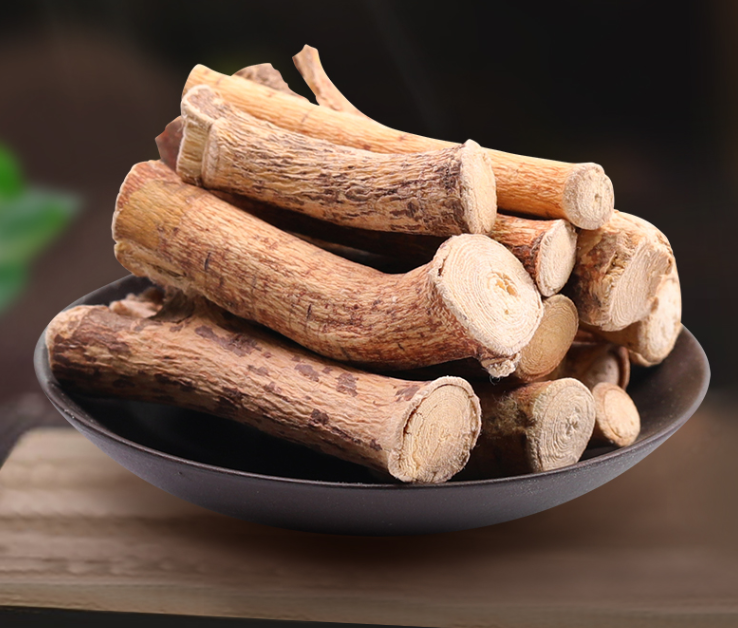
Wuzhimaotao (Five-Fingered Peach): According to the “Zhonghua Bencao,” Wuzhimaotao has a sweet flavor, a slightly warm nature, can strengthen the spleen, tonify the lungs, promote qi, drain dampness, and relax the muscles and joints. Additionally, it has the characteristic of tonifying qi and nourishing yin without causing dryness, having similar effects to Astragalus but being milder, hence it is called “Southern Astragalus.”
For daily dampness removal, you can learn from the practices of the Cantonese, using Wuzhimaotao paired with honey dates, gorgon fruit, and poria to make soup, or like me, using 10 grams of Wuzhimaotao + 5 grams of poria + 1 piece of jujube (broken) to brew a health tea, both transforming and draining dampness while tonifying the spleen and boosting qi, achieving both goals.
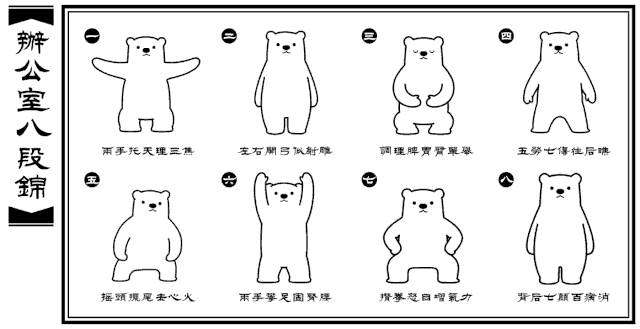
3. Appropriate Movement
“Appropriate movement” refers not only to moderate and suitable physical exercise but also to simple techniques that promote the health of the spleen and stomach, facilitating the flow of qi and blood within the body.
First, appropriate exercise, achieving moderate sweating, can indeed remove dampness, invigorate yang energy, and promote the health of the spleen and stomach. For those lacking exercise, often sitting for long periods, and preferring to stay indoors, this is much more effective than relying solely on food and drink to remove dampness.
In terms of exercise, besides jogging, walking, brisk walking, and skipping rope, gentle exercises like Baduanjin, Tai Chi, and Wuqinxi are also very effective for removing dampness, unblocking meridians, and guiding qi and blood. The simplest, everyone can focus on practicing the “Double Hands Holding Up the Sky” and “Regulating the Spleen and Stomach by Single Lifting” from Baduanjin.
In summary, no method for removing dampness is universally effective, one-size-fits-all, or can be applied once and for all. Establishing the right mindset and developing good habits is far more effective than holding onto a pile of methods and trying them out.
The above is for reference only; please adjust under the guidance of a physician.
Reviewed by: Pharmacist Lu
Edited by: Sanqi Xiaomei
Return to the main pageReply with any keywords
to view the corresponding articles
| Back Diagnosis | Face Diagnosis | Tongue Diagnosis | Sweat Diagnosis | Eye Diagnosis | Differentiation |
| Gua Sha | Cupping | Moxibustion | Acupoint Pressing | Foot Therapy | Meditation |
| Patting | Stretching | Veins | Nails | Acne | Stones |
| Liver Cirrhosis | Home Feng Shui | Three-Fu Pasting | Vinegar-Pickled Eggs |
| Tips | Tests | Winter Illness Summer Treatment | Self-Healing |

